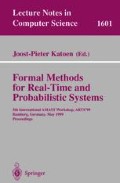Abstract
This paper discusses the adaptation of the PVS theorem prover for performing analysis of real-time systems written in the ASTRAL formal specification language. A number of issues were encountered during the encoding of ASTRAL that are relevant to the encoding of many real-time specification languages. These issues are presented as well as how they were handled in the ASTRAL encoding. A translator has been written that translates any ASTRAL specification into its corresponding PVS encoding. After performing the proofs of several systems using the encoding, PVS strategies have been developed to automate the proofs of certain types of properties. In addition, the encoding has been used as the basis for a transition sequence generator tool.
Access this chapter
Tax calculation will be finalised at checkout
Purchases are for personal use only
Preview
Unable to display preview. Download preview PDF.
References
Alborghetti, A., A. Gargantini, and A. Morzenti. Providing automated support to deductive analysis of time critical systems. Proc. 6th European Software Engineering Conf., 1997.
Archer, M. and C. Heitmeyer. Mechanical verification of timed automata: a case study. Proc. Real-Time Technology and Applications Symp., pp. 192–203, 1996.
Bun, L. Checking properties of ASTRAL specifications with PVS. Proc. 2nd Annual Conf. of the Advanced School for Computing and Imaging, pp. 102–107, 1996.
Bun, L. Embedding Astral in PVS. Proc. 3rd Annual Conf. of the Advanced School for Computing and Imaging, pp. 130–136, 1997.
Coen-Porisini, A., C. Ghezzi, and R.A. Kemmerer. Specification of realtime systems using ASTRAL. IEEE Transactions on Software Engineering, 23(9): 572–598, 1997.
Coen-Porisini, A., R.A. Kemmerer, and D. Mandrioli. A formal framework for ASTRAL inter-level proof obligations. Proc. 5th European Software Engineering Conf., pp. 90–108, 1995.
Coen-Porisini, A., R.A. Kemmerer, and D. Mandrioli. A formal framework for ASTRAL intralevel proof obligations. IEEE Transactions on Software Engineering, 20(8): 548–561, 1994.
Crow, J., S. Owre, J. Rushby, N. Shankar, and M. Srivas. A tutorial introduction to PVS. Workshop on Industrial-Strength Formal Specification Techniques, 1995.
Ghezzi, C. and R.A. Kemmerer. ASTRAL: an assertion language for specifying realtime systems. Proc. 3rd European Software Engineering Conf., pp. 122–140, 1991.
Ghezzi, C. and R.A. Kemmerer. Executing formal specifications: the ASTRAL to TRIO translation approach. Proc. Symp. on Testing, Analysis, and Verification, 1991.
Gordon, M. Notes on PVS from a HOL perspective. Available at <http://www.cl.cam.ac.uk/users/mjcg/PVS.html>, 1995.
Gordon, M.J.C. and T.F. Melham (eds.). Introduction to HOL: a theorem proving environment for higher order logic. Cambridge University Press, 1993.
Hale, R., R. Cardell-Oliver, and J. Herbert. An embedding of timed transition systems in HOL. Formal Methods in System Design, 3(1–2): 151–174, 1993.
Heitmeyer, C. and D. Mandrioli (eds.). Formal methods for real-time computing. John Wiley, 1996.
Kaufmann, M. and J. Strother Moore. ACL2: an industrial strength version of Nqthm. Proc. 11th Annual Conf. on Computer Assurance, pp. 23–34, 1996.
Kolano, P.Z. Tools and techniques for the design and systematic analysis of real-time systems. Ph.D. Thesis, University of California, Santa Barbara, 1999.
Kolano, P.Z., Z. Dang, and R.A. Kemmerer. The design and analysis of real-time systems using the ASTRAL software development environment. Annals of Software Engineering, 7, 1999.
Skakkebaek, J.U. and N. Shankar. Towards a duration calculus proof assistant in PVS. 3rd Int. Symp. on Formal Techniques in Real-Time and Fault-Tolerant Systems, pp. 660–679, 1994.
Spivey, J.M. Specifying a real-time kernel. IEEE Software, 7(5): 21–28, 1990.
Young, W.D. Comparing verification systems: interactive consistency in ACL2. Proc. 11th Annual Conf. on Computer Assurance, pp. 35–45, 1996.
Author information
Authors and Affiliations
Editor information
Editors and Affiliations
Rights and permissions
Copyright information
© 1999 Springer-Verlag Berlin Heidelberg
About this paper
Cite this paper
Kolano, P.Z. (1999). Proof Assistance for Real-Time Systems Using an Interactive Theorem Prover. In: Katoen, JP. (eds) Formal Methods for Real-Time and Probabilistic Systems. ARTS 1999. Lecture Notes in Computer Science, vol 1601. Springer, Berlin, Heidelberg. https://doi.org/10.1007/3-540-48778-6_19
Download citation
DOI: https://doi.org/10.1007/3-540-48778-6_19
Published:
Publisher Name: Springer, Berlin, Heidelberg
Print ISBN: 978-3-540-66010-1
Online ISBN: 978-3-540-48778-4
eBook Packages: Springer Book Archive

